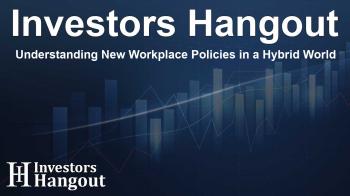Understanding New Workplace Policies in a Hybrid World

Shifting Perspectives on Office Attendance
Recent research indicates that as hybrid work becomes a norm, employees' perceptions of workplace policies are changing dramatically. Notably, 72% of workers are now expressing positive views toward return-to-office (RTO) policies. This shift indicates a growing acceptance of flexible work environments, driven by the need for enhanced employee wellbeing and workplace experiences.
The Importance of Workplace Experience
According to insights drawn from surveys conducted across 31 countries involving over 8,700 office workers, employees are increasingly expecting improvements in their workplace settings. A significant 38% of respondents believe that there is substantial room for improvement regarding office experiences. The quality of the office environment directly influences employee satisfaction, with 84% of those content with their workplace also showing optimism towards office attendance policies.
Clear Expectations in Hybrid Models
Nearly two-thirds of workers indicate that their organizations maintain clear expectations regarding in-office attendance. When expectations are transparent and the workplace is designed to support both business needs and employee wellbeing, satisfaction tends to soar. Employees report that their presence in the office enhances teamwork, as nearly 50% believe that office collaboration fosters better collective outcomes.
Challenges Revealed in Employee Feedback
However, negative perceptions persist, predominantly influenced by individuals' experiences and personal circumstances. Approximately 55% of employees cite quality of life as a crucial factor impacting their views on office mandates. The lack of adequate support in the office can exacerbate feelings of being overwhelmed or disconnected from work, especially amongst caregivers.
Variability in Acceptance Across Regions
Acceptance of attendance policies is not uniform across the globe. For instance, employees in regions such as the Middle East report a high approval rating of 87%, while North America and Latin America follow closely behind at 74% and 72%, respectively. Interestingly, adherence to attendance requirements can be considerably lower in North America compared to other regions.
Adapting to New Workforce Dynamics
The evolution of work dynamics highlights the necessity for organizations to adapt their office spaces to meet diverse employee needs. Initiatives promoting flexibility, quality workspaces, and amenities that focus on employee health and wellbeing are becoming increasingly relevant. Today’s workforce is not only seeking salary but also prioritizing work-life balance and job satisfaction.
Redefining Employee Retention Strategies
As surveyed employees express a strong interest in workplace flexibility, 65% indicate that work-life balance is now a key retention driver. Offering flexible work hours is becoming essential to enhance job satisfaction and lower turnover rates. Employers are encouraged to revisit their strategies and adapt office designs to better balance employee needs with organizational goals.
Creating Impactful Workplace Environments
Business leaders must strategize to create inclusive environments that support personal and professional growth. As Peter Miscovich, Executive Managing Director and Global Future of Work Leader, notes, investing in workplace design can lead to high-performance environments that cater to employees at various levels of their careers. Adopting a comprehensive view of employee wellbeing will be essential for fostering an organizational culture that values both professional success and personal fulfillment.
Long-Term Wellness and Support
With care and wellbeing being focal points, establishing a supportive office environment is vital. This could involve promoting wellness initiatives and creating spaces conducive to collaboration and personal comfort. By doing so, companies can not only enhance productivity but also inspire employees to thrive in their roles.
Frequently Asked Questions
What is influencing the positive perception of workplace policies?
The shift towards more flexible work arrangements, coupled with a focus on employee wellbeing, is driving positive perceptions of workplace policies.
How is hybrid work impacting employee satisfaction?
Employee satisfaction is closely tied to the experience in the workplace, with many expressing that clear expectations and supportive environments significantly boost morale.
What challenges do employees face regarding office requirements?
Many employees cite issues related to quality of life and lack of support as major challenges influencing their views on being mandated to work in the office.
How does acceptance of office attendance policies vary?
Acceptance of these policies varies by region, with higher approval rates noted in the Middle East compared to lower acceptance in Europe and parts of North America.
What role does work-life balance play in employee retention?
Work-life balance is increasingly recognized as a fundamental aspect of employee retention, with many workers prioritizing it over salary considerations.
About The Author
Contact Thomas Cooper privately here. Or send an email with ATTN: Thomas Cooper as the subject to contact@investorshangout.com.
About Investors Hangout
Investors Hangout is a leading online stock forum for financial discussion and learning, offering a wide range of free tools and resources. It draws in traders of all levels, who exchange market knowledge, investigate trading tactics, and keep an eye on industry developments in real time. Featuring financial articles, stock message boards, quotes, charts, company profiles, and live news updates. Through cooperative learning and a wealth of informational resources, it helps users from novices creating their first portfolios to experts honing their techniques. Join Investors Hangout today: https://investorshangout.com/
The content of this article is based on factual, publicly available information and does not represent legal, financial, or investment advice. Investors Hangout does not offer financial advice, and the author is not a licensed financial advisor. Consult a qualified advisor before making any financial or investment decisions based on this article. This article should not be considered advice to purchase, sell, or hold any securities or other investments. If any of the material provided here is inaccurate, please contact us for corrections.

